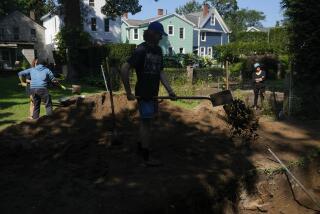South Africa’s Growing Graves : Will nation continue to tear itself apart?
- Share via
In the wake of the latest massacre, is there any realistic hope for peace in South Africa? Is there any possibility of restarting the stalled constitutional negotiations? Or will South Africa become the next Bosnia, the next Somalia?
In Monday’s massacre at least 28 supporters of the African National Congress were shot to death and 200 more were injured at a protest seeking the ouster of Brig. Gen. Oupa Gqozo, the unpopular military leader of the Ciskei, one of the so-called independent black homelands. The homelands policy, initiated 30 years ago to reinforce apartheid, has confined millions of black families to largely rural areas with no economic base and a political system based mainly on tribal or cultural allegiance. All remain dependent, however, on the South African government.
There is disagreement on what prompted the gunfire from the black Ciskei security troops, but there can be no disagreement that the blood bath has dimmed hopes of restarting constitutional negotiations.
The ANC, the chief black rival of South Africa’s ruling National Party, broke off from the talks after a massacre in the Boipatong township in June claimed more than 40 of its supporters. ANC leaders charged then that South African security forces had helped the black migrant workers who carried out that attack in support of Zulu Chief Mangosuthu Gatsha Buthelezi and his Inkatha Freedom Party. Inkatha and ANC followers have been locked in a cycle of factional violence that has claimed thousands of victims.
As a condition of return to the constitutional talks, the ANC demanded that the minority government take steps to end the township violence. The government, led by President Frederik W. de Klerk, took steps including imposing a ban on the spears used primarily by Zulu migrant workers. But the ANC leadership decided last month, at the request of its more militant rank-and-file members, to continue the boycott.
The ANC leadership also decided to challenge the reign of the Ciskei’s Gqozo, who, like the majority of the 10 homeland leaders, rules repressively. Ironically, Gqozo’s regime is likely to be short-lived. The ruling National Party and the ANC agreed before the negotiations broke off in June that a new constitution would re-integrate the homelands into South Africa. Negotiating, as that agreement indicates, can pay off.
What will mend this latest impasse? Both the government and the ANC have agreed to the presence of U.N. monitors. The U.N. observers must help get the constitutional talks back on track--before more graves are needed in South Africa.
More to Read
Sign up for Essential California
The most important California stories and recommendations in your inbox every morning.
You may occasionally receive promotional content from the Los Angeles Times.













